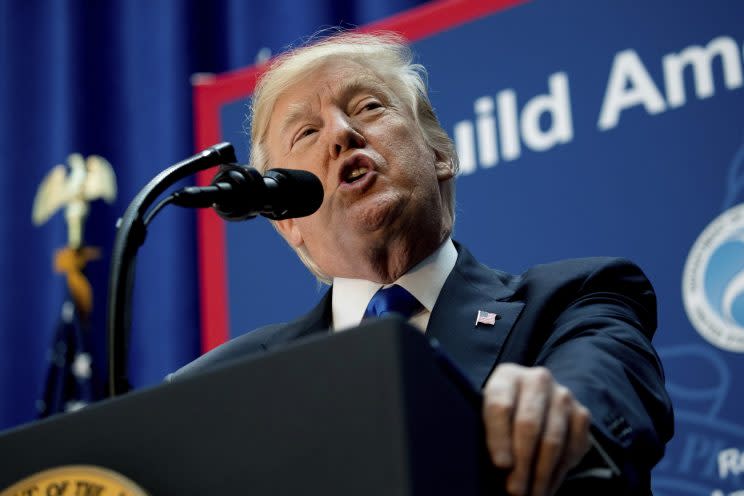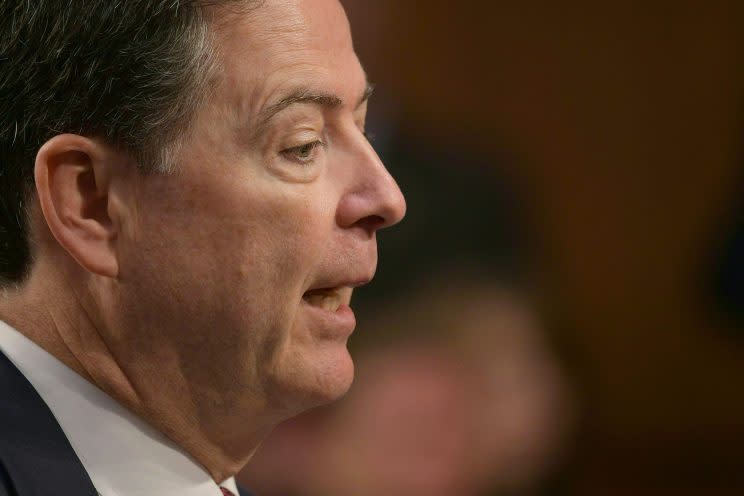Indicting a president? Legal scholars say the obstacles are very high
Former FBI director James Comey’s testimony that President Trump asked him to go easy on former national security adviser Michael Flynn has prompted some calls for a criminal investigation into possible obstruction of justice by the president.
Much of what Comey told the Senate Intelligence Committee has already been leaked to the press: Trump’s demand for loyalty, his request that the FBI “let go” of its investigation into Flynn’s contacts with foreign agents and his plea for Comey to “lift the cloud” of the Russia inquiry hanging over his administration.
In today’s fractured political climate, one’s interpretation of the entire Comey-Trump interaction and whether or not Comey’s account of the commander in chief’s actions, if true, would constitute obstruction of justice appears to depend as much on political affiliation as the facts at hand.
At the outset, even assuming for the sake of argument that Trump had obstructed justice — i.e. committed a federal crime — it seems most likely that a sitting U.S. president cannot even be indicted.
Related slideshow: ‘Lies’ to ‘Lordy’: How the world’s front pages covered the Comey testimony >>>
Neither the Constitution nor the Supreme Court has provided a conclusive answer, but the Justice Department’s Office of Legal Counsel decided on its own in 1973 (amid the Watergate scandal) that a sitting president cannot be indicted because it would interfere with his or ability to perform the actions required of the office. The department reaffirmed this belief in a memorandum for the attorney general in 2000.
Jonathan Turley, a professor of law at the George Washington University Law School, said most law scholars and academics agree that a sitting U.S. president cannot be indicted.
He said there’s some support for this in the litigation over Paula Jones’ lawsuit against former President Bill Clinton for alleged sexual harassment, which was one of the issues that precipitated his impeachment.
The Constitution provides a mechanism for removing a president by impeachment. Does that also preclude the possibility of indictment? It’s unclear, but Turley points out there’s a school of thought that presidents are in a similar category as federal judges — who are also subject to impeachment, and have been indicted in the past.

“Now it’s true the president is a different constitutional creature, but the process is largely the same,” he said. “What is clear is that we all agree the best practice is to impeach and remove a president before you prosecute.”
Impeachment is a high hurdle, especially when the president’s own party controls Congress. On the other hand, the impeachment process does not include the due process protections afforded in the criminal justice system. The president’s lawyers have to be aware that evidence collected during impeachment can later be used during the prosecution.
Though Comey’s testimony hurt Trump politically, Turley does not think it pushed the needle any closer toward a criminal charge and quite possibly undermined Comey’s potential role as witness by acknowledging that he leaked the infamous “Comey memo” to the press via a friend who teaches at Columbia Law School).
“His suggestion that those memos were his private property is difficult to square with FBI policy and written guidelines,” Turley said. “I doubt seriously that the FBI would support his view that agents can remove these documents and leak them to the media. At the minimum, I think it raises serious professional and ethical questions.”
Related slideshow: Comey and cocktails: People in bars and restaurants watch ex-FBI director’s testimony >>>
He pointed out that Comey reportedly prepared the memo on an FBI computer, in the course of his duty as an FBI director, referring to a matter under FBI investigation, in the style of a Field 302 form filed in by agents at the bureau.
Mark Harkins, a senior fellow at the Government Affairs Institute of Georgetown University, said the issue really isn’t whether or not the president can be criminally tried or not — even though Democrats might be happy for prosecutors to file a charge against him — because the courts would probably just sit on it.
“The real question is, do 218 members of the House of Representatives believe that he committed obstruction of justice? For a president to be impeached, the House of Representatives has to have articles of impeachment, which are basically the same as an indictment,” Harkins told Yahoo News.
In the president’s case, Harkins explained, the House of Representatives would act as a grand jury by filing charges (the actual impeachment) and the Senate (where those charges are tried) would perform the role of a jury.

“That’s how our political system works,” he said. “In essence, that’s it. Regardless of whether the president gets tried in a court of law, the real court is the court of politics and a majority party has never impeached a president of their own party.”
Republicans currently hold a majority in both the House of Representatives and the Senate.
Turley, who was the last lead counsel in the impeachment trial of U.S. District Judge G. Thomas Porteous in 2010 and testified during Clinton’s impeachment trial, said Trump’s actions are “not even close” to an impeachable offense and that people who think otherwise have never tried an impeachment case.
Related slideshow: James Comey testifies at Senate hearing >>>
“The analogies to Nixon or Clinton are just legally and historically unfounded,” Turley said. “The obstruction case against Nixon was grounded in clear and very serious criminal conduct, like the break in at the Watergate, the use of slush funds, the procurement of false testimony. That is what constitutes an impeachable obstruction claim.”
The articles of impeachment against former President Richard Nixon demonstrate why Trump’s alleged actions would not be impeachable, according to Turley. Article I accuses Nixon of obstruction and lists nine very serious crimes.
Benjamin Wittes, editor in chief of Lawfare and a senior fellow in governance studies at the Brookings Institution, told Yahoo News Deputy Editor Dan Klaidman that whether a sitting president can be indicted is “one of the great unanswered structural separation of powers questions in American constitutional law.”
“It is unanswered, at least in any authoritative judicial context,” Wittes said. “The Justice Department has long taken the position that the president — while he’s sitting as president — is not amenable to criminal indictment.”
He added that Robert Mueller, the special counsel overseeing the Russia investigation, might be bound by Justice Department policy in a way that an independent counsel would not be.
“We should take as a given not merely that any obstruction of justice case would be quite difficult to bring and prove but that the special counsel may not feel he is allowed to bring one in the first place,” he said.
Read more from Yahoo News:



